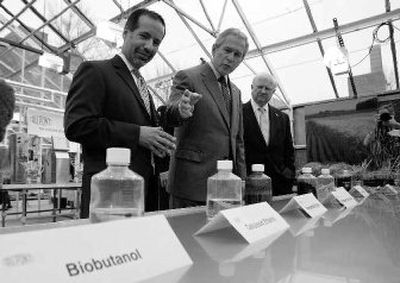Bush speech gets mixed reviews

WASHINGTON — Wall Street appeared largely unimpressed by President Bush’s State of the Union address, signaling skepticism toward the political and technological impediments to some proposals, particularly his calls for cutting gasoline use and boosting ethanol consumption.
Other businesses, including health care service providers and domestic automakers, will also have to wait and see how the Democratic Congress responds to the president’s agenda, though economists predicted Wednesday there would be few drastic changes before the 2008 presidential election.
“What happened in the market today — outside of ethanol producers — is what would have happened if there was no speech at all,” said Peter Morici, a professor at the University of Maryland’s business school.
Bush’s health care pitch included a call for a tax deduction of $7,500 for individuals and $15,000 for families regardless of whether they buy their own health insurance or receive medical coverage at work.
“The question is, will the Democrats let them go through?” Morici said.
The answer appears to be “no,” with Democrats arguing the proposal could encourage employers to drop health insurance plans, or drive healthy workers to buy their own and push prices higher.
“The agenda he (Bush) laid is one that has broad appeal,” said Rep. Chris Van Hollen of Maryland, head of the Democratic Congressional Campaign Committee. “But the issue is not identifying the problems. The issue is finding solutions, and in that area the president fell short.”
While ethanol companies’ stock prices rose leading up to the president’s speech, they fell Wednesday in part because Bush’s alternative energy proposals were not as large as some had expected, and because doubts have been raised about whether the U.S. ethanol industry can affordably meet the higher targets using feedstocks other than corn.
Energy analysts said the call for a sharp escalation in the use of ethanol will have little immediate impact on major oil companies such as Exxon Mobil Corp. and Chevron Corp., primarily because it’ll be used as a partial substitute and not a replacement for gasoline.
But Archer-Daniels-Midland Co., US BioEnergy Corp., VeraSun Energy Corp. and other corn-based ethanol producers stand to benefit from Bush’s call to raise consumption targets for ethanol and other alternative fuels to 35 billion gallons by 2017. More than 5 billion gallons of ethanol were produced in the U.S. in 2006.
Shares of Archer-Daniels-Midland dipped 54 cents to close at $32.09, and Verasun lost 47 cents, or 2.6 percent, to $17.49, both on the New York Stock Exchange. US BioEnergy lost $1.28, or 9.3 percent, to end at $12.42 on the Nasdaq Stock Market.
Overall, stock markets fared much better, with the Dow Jones industrials closing up 87.97 to set a new record of 12621.77, and the Nasdaq composite index adding 34.87 to end at 2466.28.
Automakers said they were open to the president’s goals of increasing fuel economy standards.
The proposal could benefit Japanese automakers such as Toyota Motor Corp. and Honda Motor Co., which have higher fleetwide fuel economy levels than domestic manufacturers. The proposal also includes a system of trading or “banking” credits to meet new standards, which could lead to Detroit’s automakers buying fuel credits from Toyota and Honda, both of which added more than 2.4 percent Wednesday on the NYSE.
But General Motors Corp. and Ford Motor Co. have pledged to build 2 million flexible-fuel vehicles by 2010, so they too could benefit by an influx of ethanol and other renewable fuels.